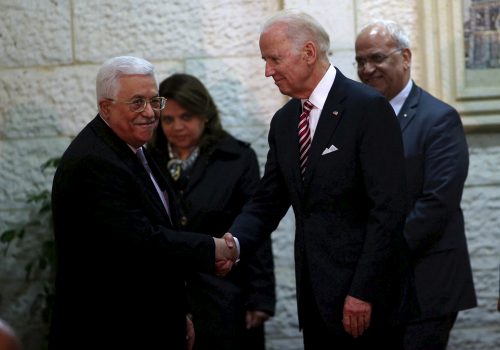The real threat to modern Israel
Israel is one of the few countries whose fundamental character is imperiled. But the main threat is no longer external: it is the internal schism between the Haredi minority—the Ultra-Orthodox—and the rest of society that has the greatest potential to change the country at its the core.
The March 23 election could emerge as an inflection point because Haredi behavior during the coronavirus pandemic has underscored divisions, deepened mutual disdain, and convinced many Israelis things cannot continue as they are. There is a clamor for change.
Prime Minister Benjamin Netanyahu is secular, but he has always been fully dependent on the Haredim; without the support of several parties representing the community, he has never commanded a genuine Knesset majority. If the nationalist-Haredi coalition is denied a majority on March 23, this could well mean change will come. Fierce opposition from the Haredim is likely, with unpredictable results.
The country of about nine million has other internal fault lines: Jews versus the fifth of its citizens who are Arabs; Middle Eastern versus European-descended Jews; and left versus right, which has morphed into opposition versus support of Netanyahu. But these pale before the secular-Haredi conflict for two reasons: it is a genuine kulturkampf and the Haredi community is growing at rates unmatched in the modern world.
Israel is a modern democracy with a per capita gross domestic product of some $40,000 per year, on par with Britain or France. Its tech sector sprouts world leaders in cybersecurity, nanotechnology, ad tech, biotech, autonomous vehicles, and more. It also punches way above its weight in scientific publications, Nobel prizes, and even exported television formats. It has been ahead of the global curve on certain issues such as gay rights, electing a female leader, and decriminalizing cannabis.
Meanwhile, the Haredim live as a separate community where men are encouraged by rabbinical leaders to devote themselves to studying religious texts at yeshiva seminaries instead of working. Generations are condemned to dependency because 60 percent of Haredi high schoolers go to institutions that, despite state funding, do not teach a core curriculum of math, science, and English. There is an expectation that the state will pay a lifelong stipend to any men who study the Torah, as at least 150,000 currently do. Official government figures show that Haredi men’s participation level in the workforce is only 48 percent—much of it in the form of state-funded make-work for religious functionaries (and their average salary of around $2,000 per month is 60 percent below the national average for men).
The stranglehold religious seminaries have on the Haredi men is maintained by a longstanding deal whereby the state absolves them of otherwise compulsory military conscription if they study the Torah (a tiny minority that enlists anyway are widely shunned by the community).
Women are expected to bear and raise children, run the household, and work. They are not allowed to run for parliament for the Haredi political parties without whom the right-wing has never enjoyed a majority (bar the arguable exception of 1977). These parties occupy themselves with securing state funding for the community and pushing for religious restrictions on the public life of all Israelis, such as preventing civil marriage and blocking commerce, work, and public transport on the Sabbath. Many in the community oppose women singing in public and studies show that two-thirds want gender segregation in public transport. More noteworthy is that 90 percent want the Halakha (Jewish law).
This setup might survive somehow in the current demographic breakdown, but this is where the birthrate comes in. According to the Israel Democracy Institute, Haredi women starting around age 20 have 7.1 children on average—as they have for decades—yielding a poverty ameliorated somewhat by child subsidies forked over by the Israeli taxpayer. The Haredi population, now at around 12 percent, doubles itself every 16 years, four times the rate of the rest of the country. Studies show perhaps 5 percent leave the Haredi lifestyle—not enough to change the projection that they will be a majority well before the century is out.
Modern Israel cannot survive this—there will be no one to fund it—unless the Haredim fundamentally change their behavior and worldview, of which there are no signs. It is more reasonable to foresee that, if anything, the process will be accelerated by secular flight.
Meanwhile, toxicity prevails. Each case of secular outrage over an attempt to silence women singing in public (or even edge cases like attempting to change the name of streets named after women) is met with Haredi dismissal of the so-called “empty cart” of secular culture. Haredim say they are content—the secular camp consider them brainwashed. Perhaps most poisonous, since the Haredim are keeping the nationalist right in power, some view them as perpetuating conflicts with Arabs in which they hypocritically refuse to fight (and laugh at the rejoinder that they are protecting the country no less importantly through prayer). Neither side respects the other.
COVID-19 brought matters to a head by exposing the degree to which the Haredim are a community apart, where rabbinical edict trumps state law.
Haredi communities were always going to be vulnerable to COVID-19 because of overcrowding, but certain sects rebelled against pandemic precautions on top of that. Videos and reports of mass weddings and prayers and illegal school openings that leading rabbis sanctioned caused the general Israeli public to seethe, especially after the government allowed them exceptions and the police were seen to be ignoring Haredi violations.
Most damagingly, the government refused its own experts’ advice for targeted lockdowns on the hardest-hit communities, which were mostly Haredi at key junctures. It preferred national lockdowns so as to not offend Netanyahu’s political allies. Consequently, Israel holds the record for having the ninth highest infection rate in the world alongside being the global leader in vaccination rollout.
Even after this, polls show that 62 percent of Haredim prefer their rabbis setting COVID policy. The same study found that almost 60 percent of respondents say that the pandemic has hurt relations between Haredi and non-Haredi Jews.
Until now, the issue, painful as it is, has taken a back seat to the Palestinian conflict. But the failure of repeated peace efforts over the past thirty years has yielded despair on that front and created an opening for this issue to take center stage.
Several parties in the center-left bloc have made changing the existing framework in the state’s relationship with the Haredim a centerpiece of their political agenda, including Yair Lapid’s Yesh Atid party, projected to be the largest in the bloc, and Avigdor Liberman’s Yisrael Beiteinu party, with its base of secular Russian-speaking immigrants (their campaign’s main slogan is “a government without Haredim”). Even Naftali Bennet’s Yamina party, while more nationalist than even Likud, represents a “national religious” stream that does not reject the authority of the state unlike the Haredim.
Polls show the election too close to call. But if Netanyahu is defeated, several reforms could start to be discussed, with varying degrees of urgency and chances of implementation:
- Denying state funding to schools that refuse to teach a core curriculum aimed at creating employable graduates.
- Reorganizing child subsidies to encourage family planning.
- Ramping down the endless payments to yeshiva students.
- Ending the draft exemption for yeshiva students.
- Massive funding for retraining Haredim for the modern economy.
None of this will go down well with the Haredi community. There will be charges of “anti-Semitism” and probably rioting in the streets. But the choice before secular Israel is as urgent as it is difficult.
Dan Perry is the former Cairo-based Middle East editor and London-based Europe/Africa editor of the Associated Press. He is also the managing partner of the New York-based communications firm Thunder11. Follow him on Twitter: @perry_dan.
Image: Ultra Orthodox Jews take part in a funeral of a Jewish spiritual leader amid the coronavirus disease (COVID-19) restrictions in Jerusalem January 31, 2021. REUTERS/Ronen Zvulun


